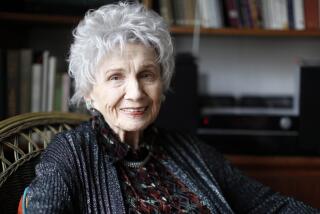Carol Shields, 68; Pulitzer-Winning Canadian Writer Explored the Lives of Everyday Women
- Share via
Carol Shields, an acclaimed Canadian writer whose novel “The Stone Diaries” earned her a Pulitzer Prize in 1995, has died. She was 68.
Shields, whose novels portrayed ordinary people, particularly women, in everyday situations, died Wednesday in Victoria, Canada, after a long battle with breast cancer.
Born in the United States, Shields was an English graduate of Hanover College in Indiana who moved to Canada as a 22-year-old newlywed in 1957. She raised five children, published two books of poetry and one of criticism and earned a master’s degree before her first novel, “Small Ceremonies,” was published in 1976, when she was 40.
She became one of Canada’s most respected writers, known for her stylistic inventiveness.
In all, she wrote 10 novels and three collections of short stories in addition to poetry, plays, critical studies and a biography of Jane Austen. She recently served as co-editor on the second of two volumes of “Dropped Threads,” an anthology of women’s writing.
Shields achieved international fame -- and leaped onto the bestseller lists -- with the publication of “The Stone Diaries,” a fictional biography of Daisy Goodwill Flett. The character is a middle-class Canadian “woman of moderate intelligence and medium-sized ego and average good luck” whose life spans eight decades and demonstrates, as one reviewer wrote, that “there are no small lives, no lives out of which significance does not shine.”
A reviewer for the New York Times Book Review wrote that Shields “explored the mysteries of life with abandon, taking unusual risks along the way. ‘The Stone Diaries’ reminds us again why literature matters.”
The novel, published by Random House Canada in 1993 and by Viking in the United States in 1994, not only earned Shields the Pulitzer -- an American award for which she was eligible because she had kept her U.S. citizenship when she became a Canadian -- but also the National Book Critics Circle Award and Canada’s Governor General’s Literary Award.
The book also was short-listed for the Booker Prize, Britain’s most prestigious literary award.
In an interview, Shields said: “I’ve been witness to this huge change for women in the second half of the 20th century. They say you write the same novel over and over, and the idea of women being fully human has always been a preoccupation.”
In the wake of the acclaim for “The Stone Diaries,” the government of France named Shields a Chevalier of the Order of Arts and Letters, and a number of universities bestowed honorary degrees on her.
The novel’s success enabled Shields to buy a summer home in France, which she dubbed “Chateau Pulitzer.”
Her 1997 novel “Larry’s Party” -- about an “ordinary” man with two ex-wives and a teenage son -- won England’s $70,000 Orange Prize, which is awarded for the best book by a female writer in the English-speaking world.
For “Jane Austen,” a short biography of the English novelist for the Penguin Lives series published in 2000, Shields was awarded Canada’s $25,000 Charles Taylor Prize for the best literary nonfiction.
“Unless,” her final novel, a Booker Prize finalist last year, is about a middle-aged Canadian woman -- a writer -- who is struggling with a daughter who drops out of college to live on a Toronto street corner, where she wears a cardboard sign on her chest that says, “Goodness.”
Although Shields’ work had achieved great critical acclaim in recent years, her four early novels, including “The Box Garden,” “Happenstance” and “A Fairly Conventional Woman,” were not taken seriously by some critics.
“When I first started publishing novels in the ‘70s, there were reviews that called them ‘domestic’ novels and ‘women’s’ novels, and spoke of them quite lightly,” Shields said in an interview with Reuters last year.
“But, you know, that didn’t bother me at all,” she said, “because I knew the lives of women were important, and I thought these critics were wrong and I was right.
“I think it’s time that we acknowledge that we all have a domestic life. Every person in the world has a domestic life, but you wouldn’t know that reading Hemingway.
“I love domesticity,” she added. “I love the idea of home, and I think that is, in the end, what serious novels are about: the search for home.”
Shields was born June 2, 1935, in the Chicago suburb of Oak Park. She was the youngest of three children whose father managed a candy factory and whose mother taught fourth grade.
At Oak Park High School, Shields wrote for the campus literary magazine and dreamed of becoming a writer.
“I got this reputation as the ‘literary kid,’ ” she told the Chicago Tribune in April of this year.
Her parents and teachers encouraged her to be a writer, she said. “I think writers must live in a place where writing is honored.”
At Hanover College, she continued writing stories and what she later deemed “terrible poems.”
She met her Canadian husband, Don, then a young engineering graduate, during her junior year abroad in England. They were married the week of her graduation in 1957 and settled in Canada, where Shields took on the role of what she called “a typical 1950s housewife.”
“Then in the 1970s,” she told a British journalist, “I took a master’s degree, got involved in left-wing politics, learned French and gradually woke up.”
From 1980 to 2000, Shields taught literature at the University of Manitoba, in addition to serving the last four of those years as chancellor of the University of Winnipeg.
She was diagnosed with advanced breast cancer just before Christmas 1998. She underwent a mastectomy, chemotherapy and radiation treatments -- and continued writing as she and her family came to terms with her approaching death.
In the months before she died, she was working on another novel, which remains unfinished.
“I’ve stopped writing several times, through some of the worst phases” of cancer treatment, she told the Chicago Tribune in April. “But I always start again. It’s a kind of consolation. And there’s something about wanting to go home to write that final book.”
In addition to her husband, a retired engineering professor, Shields is survived by her children, John, Catherine, Meg and Sara and Anne; 11 grandchildren; a brother, Robert Warner; and a sister, Barbara Hipple.
More to Read
Sign up for our Book Club newsletter
Get the latest news, events and more from the Los Angeles Times Book Club, and help us get L.A. reading and talking.
You may occasionally receive promotional content from the Los Angeles Times.










